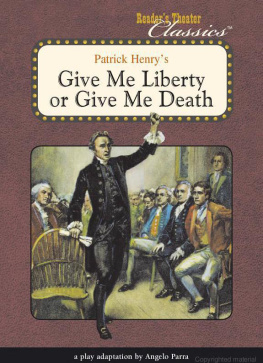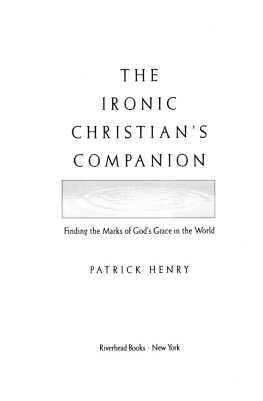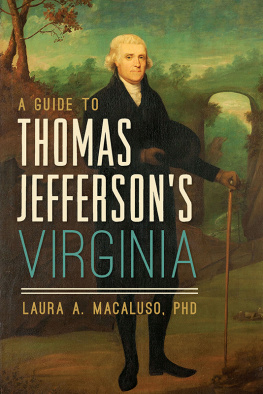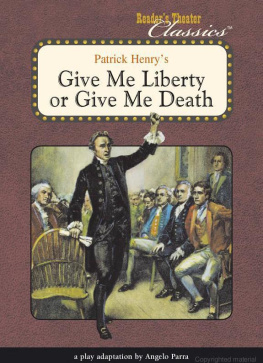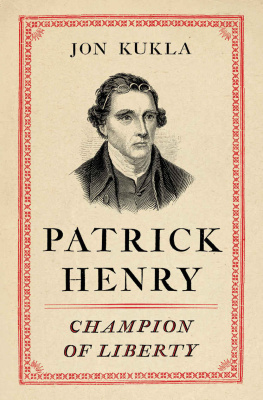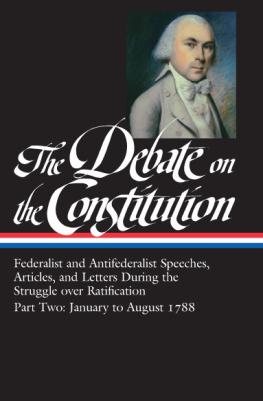About Henry:Patrick Henry (May 29, 1736 June 6, 1799) served as the firstpost-colonial Governor of Virginia from 1776 to 1779. A prominentfigure in the American Revolution, Henry is known and rememberedfor his "Give me Liberty, or give me Death!" speech, and one of theFounding Fathers of the United States. Along with Samuel Adams andThomas Paine, he is remembered as one of the most influential (andradical) advocates of the American Revolution and republicanism,especially in his denunciations of corruption in governmentofficials and his defense of historic rights.
Note: This book is brought toyou by Feedbooks
http://www.feedbooks.com
Strictly for personal use, do not use this file for commercialpurposes.
No man thinks more highly than I do of the patriotism, as wellas abilities, of the very worthy gentlemen who have just addressedthe House. But different men often see the same subject indifferent lights; and, therefore, I hope it will not be thoughtdisrespectful to those gentlemen if, entertaining as I do opinionsof a character very opposite to theirs, I shall speak forth mysentiments freely and without reserve. This is no time forceremony. The question before the House is one of awful moment tothis country. For my own part, I consider it as nothing less than aquestion of freedom or slavery; and in proportion to the magnitudeof the subject ought to be the freedom of the debate. It is only inthis way that we can hope to arrive at truth, and fulfill the greatresponsibility which we hold to God and our country. Should I keepback my opinions at such a time, through fear of giving offense, Ishould consider myself as guilty of treason towards my country, andof an act of disloyalty toward the Majesty of Heaven, which Irevere above all earthly kings.
Mr. President, it is natural to man to indulge in the illusionsof hope. We are apt to shut our eyes against a painful truth, andlisten to the song of that siren till she transforms us intobeasts. Is this the part of wise men, engaged in a great andarduous struggle for liberty? Are we disposed to be of the numberof those who, having eyes, see not, and, having ears, hear not, thethings which so nearly concern their temporal salvation? For mypart, whatever anguish of spirit it may cost, I am willing to knowthe whole truth; to know the worst, and to provide for it.
I have but one lamp by which my feet are guided, and that is thelamp of experience. I know of no way of judging of the future butby the past. And judging by the past, I wish to know what there hasbeen in the conduct of the British ministry for the last ten yearsto justify those hopes with which gentlemen have been pleased tosolace themselves and the House. Is it that insidious smile withwhich our petition has been lately received? Trust it not, sir; itwill prove a snare to your feet. Suffer not yourselves to bebetrayed with a kiss. Ask yourselves how this gracious reception ofour petition comports with those warlike preparations which coverour waters and darken our land. Are fleets and armies necessary toa work of love and reconciliation? Have we shown ourselves sounwilling to be reconciled that force must be called in to win backour love? Let us not deceive ourselves, sir. These are theimplements of war and subjugation; the last arguments to whichkings resort. I ask gentlemen, sir, what means this martial array,if its purpose be not to force us to submission? Can gentlemenassign any other possible motive for it? Has Great Britain anyenemy, in this quarter of the world, to call for all thisaccumulation of navies and armies? No, sir, she has none. They aremeant for us: they can be meant for no other. They are sent over tobind and rivet upon us those chains which the British ministry havebeen so long forging. And what have we to oppose to them? Shall wetry argument? Sir, we have been trying that for the last ten years.Have we anything new to offer upon the subject? Nothing. We haveheld the subject up in every light of which it is capable; but ithas been all in vain. Shall we resort to entreaty and humblesupplication? What terms shall we find which have not been alreadyexhausted? Let us not, I beseech you, sir, deceive ourselves. Sir,we have done everything that could be done to avert the storm whichis now coming on. We have petitioned; we have remonstrated; we havesupplicated; we have prostrated ourselves before the throne, andhave implored its interposition to arrest the tyrannical hands ofthe ministry and Parliament. Our petitions have been slighted; ourremonstrances have produced additional violence and insult; oursupplications have been disregarded; and we have been spurned, withcontempt, from the foot of the throne! In vain, after these things,may we indulge the fond hope of peace and reconciliation. There isno longer any room for hope. If we wish to be freeif we mean topreserve inviolate those inestimable privileges for which we havebeen so long contendingif we mean not basely to abandon the noblestruggle in which we have been so long engaged, and which we havepledged ourselves never to abandon until the glorious object of ourcontest shall be obtainedwe must fight! I repeat it, sir, we mustfight! An appeal to arms and to the God of hosts is all that isleft us!
They tell us, sir, that we are weak; unable to cope with soformidable an adversary. But when shall we be stronger? Will it bethe next week, or the next year? Will it be when we are totallydisarmed, and when a British guard shall be stationed in everyhouse? Shall we gather strength by irresolution and inaction? Shallwe acquire the means of effectual resistance by lying supinely onour backs and hugging the delusive phantom of hope, until ourenemies shall have bound us hand and foot? Sir, we are not weak ifwe make a proper use of those means which the God of nature hathplaced in our power. The millions of people, armed in the holycause of liberty, and in such a country as that which we possess,are invincible by any force which our enemy can send against us.Besides, sir, we shall not fight our battles alone. There is a justGod who presides over the destinies of nations, and who will raiseup friends to fight our battles for us. The battle, sir, is not tothe strong alone; it is to the vigilant, the active, the brave.Besides, sir, we have no election. If we were base enough to desireit, it is now too late to retire from the contest. There is noretreat but in submission and slavery! Our chains are forged! Theirclanking may be heard on the plains of Boston! The war isinevitableand let it come! I repeat it, sir, let it come.
It is in vain, sir, to extenuate the matter. Gentlemen may cry,Peace, Peacebut there is no peace. The war is actually begun! Thenext gale that sweeps from the north will bring to our ears theclash of resounding arms! Our brethren are already in the field!Why stand we here idle? What is it that gentlemen wish? What wouldthey have? Is life so dear, or peace so sweet, as to be purchasedat the price of chains and slavery? Forbid it, Almighty God! I knownot what course others may take; but as for me, give me liberty orgive me death!
Patrick Henry, March 23,1775.
Loved this book ?
Similar users also downloaded
- Bertrand Russell
PoliticalIdeals

